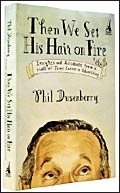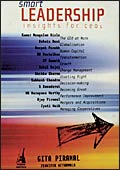 |
THEN WE SET HIS HAIR ON FIRE
Phil Dusenberry
Penguin Portfolio
PP: 290
Price: Rs 425 |
Then
we set his hair on fire is not an academician's guide on what
works and what doesn't in advertising. Coming from the pen of
an ad veteran, the book is essentially a practitioner's handbook
on where the winning ideas come from. The book is largely a personal
memoir where the author, Phil Dusenberry, who started his career
in 1962 as a copywriter in BBDO and finally rose to be its Chairman
and CEO of North America, takes a walk through the 40 years spent
in the agency and the profession. So is it all about the pitches
Dusenberry won and the taglines he created? No. The book also
talks about good and bad advertising but in an informal and unfussy
way. Lessons on rights and wrongs come in, but they come in quite
casually as he talks about his experiences with clients, colleagues
and projects. And that is what makes the book quite readable.
Dusenberry, who is credited with some of
the most celebrated ad slogans for companies like GE (We Bring
Good Things To Life; endured from 1979 to 2003), Visa (It's Everywhere
You Want To Be) and Gillette (The Best A Man Can Get), starts
with challenging the premise that ideas are paramount in creative
business. His argument is that it is not ideas, but insights that
are more important. Ideas, he says, can inspire a great commercial
but "a good insight can fuel a thousand ideas, a thousand
commercials". He builds his case by sharing experiences with
GE, Visa, FedEx, Pepsi and Ronald Reagan.
Dusenberry maintains that a scientific approach
in going about the business is a prerequisite, but one's own intuitions
are more helpful. And sometimes, even unintended consequences
yield unexpected results. According to him, the simple linear
matrix of research, analysis, insight, strategy and execution,
followed by most agencies, doesn't work. "... because you
can't predict when you'll capture lightning in a bottle and even
if you do, you can't guarantee that the client will be smart enough
to recognise the lightning when he sees it".
To elucidate this, he narrates an accident
that occurred during the shooting of a TV commercial for Pepsi
featuring Michael Jackson. Jackson's hair caught fire on the sets
(and that's where the book draws its title from). Pepsi executives
were worried that it would lead to negative publicity, but on
the contrary the accident became the most covered event on TV
and in press and Pepsi got coverage worth $13 million for no cost.
If not for some extremely insightful lessons
on advertising, it makes a good reading for such incidents and
accidents that Dusenberry recounts through the book.
 |
INSIGHTS FOR CEOS
Gita Piramal with Jennifer
Netarwala
Penguin Portfolio
PP: 207
Price: Rs 325 |
SMART LEADERSHIP
CEO autobiographies
usually end up being best-sellers in the publishing business.
Know why? Because just about every executive wants to know the
secret sauce that makes a successful CEO. So, be it Jack Welch's
Straight from the Gut, or Louis Gerstner's Who Says Elephants
Can't Dance?, such books debut to a ready audience. In India,
we don't have too many CEO autobiographies or biographies (those
of M.S. Oberoi and H.P. Nanda are the only two top of mind), so
Gita Piramal's Smart Leadership is an effort to fill a large void.
The good part about her book, though, is that it doesn't feature
just one CEO but a dozen, including heavyweights like Kumar Mangalam
Birla, Rahul Bajaj, N.R. Narayana Murthy, Deepak Parekh and S.
Ramadorai. The topics range from globalisation and human capital
to change management and greatness. In her introduction to the
book, Piramal says that two questions have always bothered her:
"What makes leaders special, and why are there so few world-class
companies in India?". Smart Leadership at least partly answers
those questions.
|





